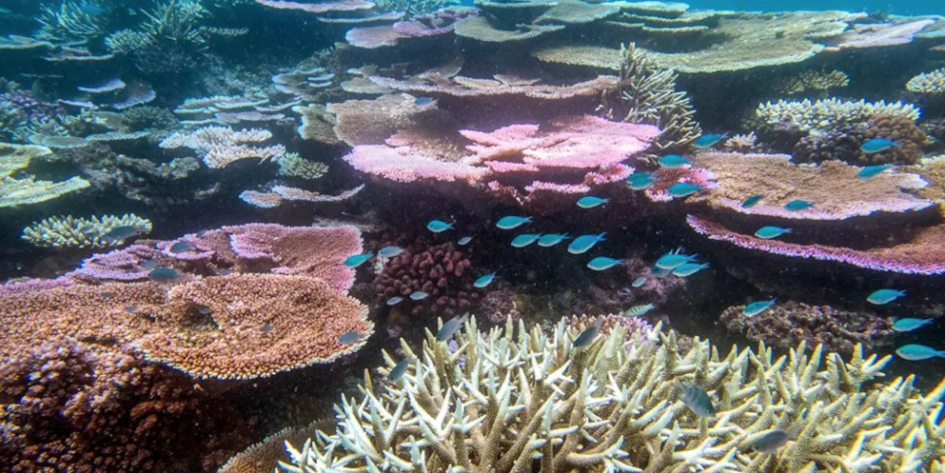
Koralen

U bent hier: inhoudsopgave - aarde - flora - koralen
Afkorting of begrip onbekend ? Raadpleeg ons milieuwoordenboek !
Follow@plattezaken
en Facebook of Linkedin
Warm water en opbleken (Eng: bleaching)

Bron: Twitter, 3-9-2023

Bron: Peter Ridd: Coral in a Warming World: Causes for Optimism (pdf)
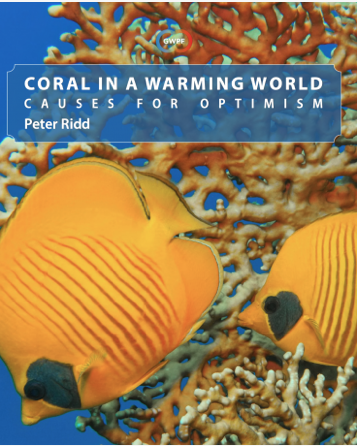
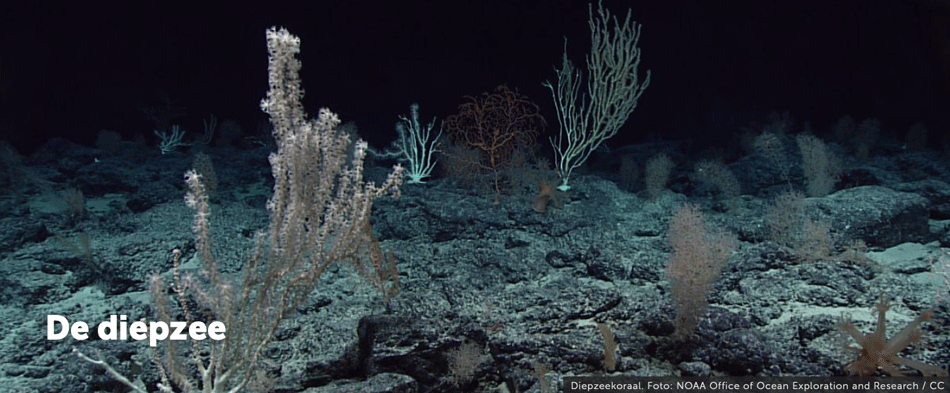
De gemiddelde diepte van de oceanen op aarde is ongeveer 3.960 meter, dus bijna 4 km.. Dat is ongeveer dertien Eiffeltorens bovenop elkaar. Het diepste punt, de Marianentrog bij de Filippijnen, ligt op meer dan elf kilometer. De hoogste berg, de Mount Everest, zou vanaf dit punt op de bodem meer dan twee kilometer water boven zich hebben
De omstandigheden in de diepzee zijn zeer extreem. Per tien meter diepte neemt de druk met één atmosfeer toe. De intensiteit van het licht dat vanaf de oppervlakte in de diepte doordringt, neemt snel af. Op 800 meter is er alleen nog een vaag blauwig schijnsel over. Nog verder naar beneden, op duizend meter diepte, is het pikdonker en bestaat er geen verschil tussen dag en nacht. De temperatuur van het water is doorgaans niet hoger dan twee graden Celsius. Zuurstof, opgelost in het water, is er maar mondjesmaat beschikbaar. En voedsel is er extreem schaars.
Op de bodem van de diepzee
Tot ongeveer 1.000 m diepte is er veel leven in zee: bijvoorbeeld kreeften, sponzen, koralen en koraalriffen. Langs de hellingen naar de diepzee treffen we haaien en roofvissen aan, maar op de bodem van de oceaan lijkt alles zo doods als een woestijn. Toch is ook hier leven, tot zelfs in de bodem. In de diepte treffen we bijvoorbeeld zeekomkommers aan, een soort roofdieren. Ook zijn er zee-egels en diepzeewormen. Maar de bodem van de diepzee is toch vooral nog onbekend terrein voor de mens, terra incognita. Steeds weer worden er nieuwe, onbekende soorten ontdekt.
(bron: museon.nl)
Maui News, January 22, 2019: Coral Reefs in West Hawaï Showing Signs of Recovery.
Nearly four years after the worst bleaching event in the state’s history, coral reefs in West Hawai?i are stabilizing and poised to recover, according to scientists from The Nature Conservancy.
Higher than usual ocean water temperatures in 2015 caused the first statewide coral bleaching event. TNC surveys revealed that an average of 60% of corals in West Hawai?i bleached, with some reefs experiencing up to 90% mortality. Corals bleach under stress, and severe or prolonged stress can lead to death.
For the last three years, TNC scientists have studied West Hawai?i’s coral reefs to identify the most resilient, meaning they can resist or recover from the stress of warmer ocean temperatures.
“Bleaching events like what occurred in 2015 can overstress a coral reef to the point where it may never recover,” said Dr. Eric Conklin, director of marine science for TNC’s Hawai?i program. “We surveyed over 14,000 coral colonies at 20 sites along the West Hawai?i coast from Kawaihae to Keauhou and were thrilled to see that many of the area’s reefs have stabilized, which is the first step toward recovery.”
Surveys showed that many of the most resilient reefs are in remote areas with limited shoreline access and exposure to human impacts. These reefs had lots of corals and little or no coral disease, and there was evidence that new corals were beginning to grow.
The least resilient sites all had multiple “stressors,” including fishing pressure, land-based pollutants and runoff. “Interestingly, the number of stressors affecting an area, not the severity of a single one, was the most important factor,” said Kim Hum, the Conservancy’s marine program director. “Reefs that are fighting the impacts of several stressors are more susceptible to temperature stress, making them more likely to bleach and less able to recover if they do.”
Surveys identified 25 coral species in West Hawai?i. Lobe coral (Porites lobata), one of the area’s most dominant species, proved to be the most resilient—with only 50% bleaching in 2015. Cauliflower corals (Pocillopora meandrina) were hardest hit—with 98% bleaching—but recent surveys show that they are beginning to recover.
“With more frequent and severe bleaching anticipated in the years ahead, there is a lot we need to do in West Hawai?i and across the state to minimize the impacts of a warming climate on our reefs,” Hum said. “We can make sure remote areas with few stressors stay that way, and we can reduce pressures from over-fishing, land-based pollutants and runoff in more populated areas.”
Currently, only 6% of State waters (out to three nautical miles) and 12% of nearshore waters (to a depth of 50 meters) have some form of management. To ensure the long-term health of Hawai?i’s coral reefs—and the food, jobs, and coastal protection they provide for Hawai?i’s residents—the State has committed to effectively manage 30% of the nearshore marine environment by 2030. The results of these surveys will help determine where and how to invest to ensure that Hawai?i’s most resilient reefs are protected.
Australië , Het Great Barrier Reef
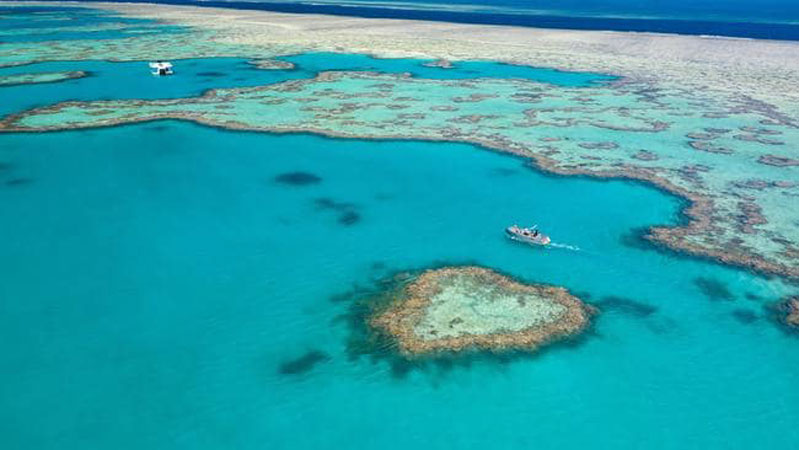
An Aerial view of the world famous Heart Reef at Whitsunday Island. Australia, picture Brooke Miles / Riptide Creative
In May 2018, after an academic career of more than 30 years, Prof. Peter Ridd had his employment terminated as a professor of physics at James Cook University in Townsville, Australia. Peter had spoken against the accepted orthodoxy that climate change was ‘killing’ the Great Barrier Reef.
"There’s some absolute rubbish being spoken about the reef and people’s livelihoods are being put in jeopardy. If nobody will stand up, then this is just going to go on and on and on. It has to be stopped".
Peter’s court case has enormous implications for the international debate about climate change, and for the ongoing crisis surrounding freedom of speech.
Professor Peter Ridd van James Cook University in Australië mag worden den beschouwd als de Jeanne D'Arc van de Australische klimaatwetenschap. Deze gerenommeerde koraal-wetenschapper werd door de universiteit ontslagen, o.a. omdat hij grote en fundamentele kritiek had op het daar uitgevoerde koraal-rif-onderzoek, o.a wegens het gebrek aan replicatie-onderzoek. Zie Climategate.nl van 23-5-2018. Hij heeft zijn ontslag aangevochten, waar heel wat wetenschappers de handdoek al lang in de ring zouden hebben gegooid en met de staart tussen de benen zouden zijn afgedropen. Wat begon als een kwestie over de kwaliteit van koraalrif-onderzoeken is uitgegroeid tot een proces over academische vrijheid in algemene zin, met een wereldwijde relevantie. |
||
| In april 2019, na $ 260.000 proceskosten, heeft een rechtbank alle aanklachten van de universiteit jegens Ridd verworpen en geconstateerd dat zijn ontslag onrechtmatig was.
Zoals Niall Ferguson het in een van zijn columns stelt: "Een aanval op de academische vrijheid van één wetenschapper moeten we beschouwen als een aanval op de academische vrijheid van alle wetenschappers". |
||
Nadere details:
Another case is that of Professor Peter Ridd of James Cook University, Townsville, Australia. He has recently been fired because of his opinions on the Great Barrier Reef (GBR). In his opinion, based on the research by him and his students, the scare stories about the health of the Great Barrier Reef were highly exaggerated. He was fired by his university for allegedly multiple breaches of its code of conduct. He was also censured for denigrating research carried out at the James Cook University’s Centre of Excellence for Coral Reef Science and the Australian Institute of Marine Science. He was also accused of scientific misconduct (bron: Post-modernism and Climate Change (Journal of the Indian Association of Sedimentologists, vol 35, No2, 2018), citaat gevonden in: Gerrit van der Lingen, Het groene boekje, Climatagate.nl, 16-2-2019).
In april 2019, na $ 260.000 proceskosten, heeft een rechtbank alle aanklachten van de universiteit jegens Ridd verworpen en geconstateerd dat zijn ontslag onrechtmatig was. Zie hier of hier voor een verslag van de rechtzaak in de Spectator Australia, hier voor ABC News van 16-4-2019. De rechtzaken worden vervolgd, o.a met een eis van Ridd opnieuw te worden aangesteld en financiële compensatie. De Universiteit zou ook nog in beroep kunnen gaan. Ze hebben financiëel gezien heel wat diepere zakken ! Heel wat wetenschappers zouden de handdoek al lang in de ring hebben gegooid en met de staart tussen de benen zijn afgedropen
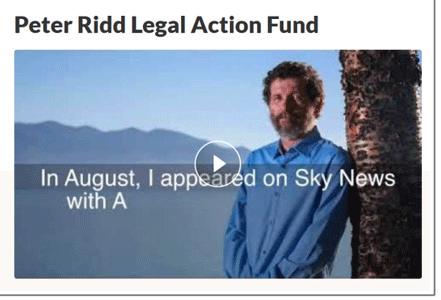 |
Maar in sept. 2019 blijkt dat de Cook universiteit in beroep gaat. Met advocaten die onvoorstelbare uurtarieven rekenen...... Peter Ridd vecht terug en vraagt de wtenschappelijke gemeenschap hem financiëel te steunen tegen deze intimidatie van de wetenschappelijke integriteit door Cook Univerity. Lees hier zijn uitleg en verzoek tot financiële ondersteuning. |
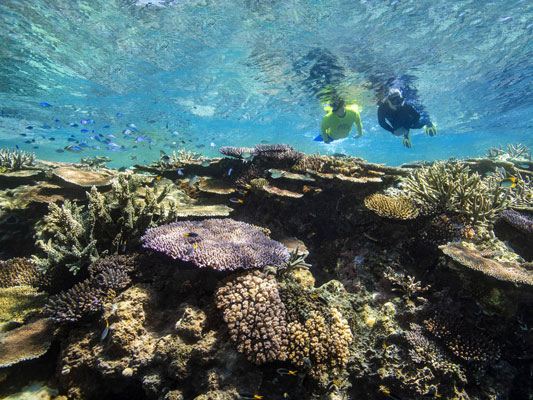
klik op de foto voor een vergroting - Picture: Supplied.
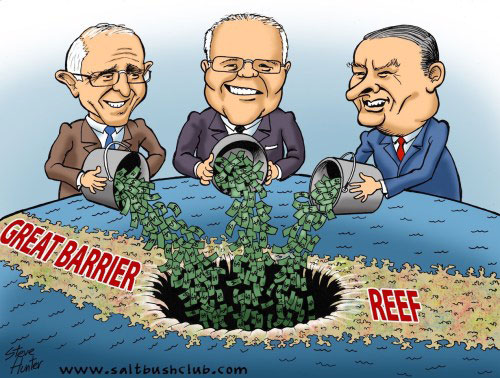
In 2012, Malcolm Turnbull snitched $440 million from taxpayers to “save the Great Barrier Reef.”
In 2022, Scott Morrison promised to pour another billion into the Barrier Reef Black Hole.
Then last week Anthony Albanese promised another $220 million “to save the reef from yellow-crazy ants.”
A million here, a billion there and pretty soon you are talking real money.
Clearly, the Great Barrier Reef has a bottomless black hole that demands a regular sacrifice from taxpayers.
Corals have survived for millions of years. They laughed off Ice Ages and warm eras, volcanic eruptions, tsunamis, and dramatic changes in sea levels.
They will outlast this green invasion with its deluge of dollars.
Literatuur over het Great Barrier Reef:
- Alexander, Ralph B., No Evidence for Dramatic Loss of Great Barrier Reef Corals, Science under attack, 30-11-2020
- Forbes, Viv, The bottomless black hole in the great barrier reef, Climatechangedispatch, May 16th 2022.
- Homewood, Paul, The “Great Barrier Reef Is Dying” Scam, wattsupwiththat, 9-3-2024
- Ridd, Peter, It's the science that's rotten, not the Great Barrier Reef , The Australien, 7-12-2020, published by the GWPF, 7-12-2020.
- Ridd, Peter, Coral in a Warming World: Causes for Optimism (pdf), GWPF report5, 2023.
Literatuur
Alexander, Ralph B., No Evidence for Dramatic Loss of Great Barrier Reef Corals, Science under attack, 30-11-2020
Tony Heller over gesjoemel met klimaatdata, Climategate.nl, 3-1-2024.
Moore, Patrick, Ocean "Acidification" Alarmism Reconsidered, Publ. by Patrick Moore, ISBN: 978-0-9686404-2-5
Sterling Burnett, H, Despite Coral Reefs Thriving, Computer-Modeled Study Predicts Climate Doom, Climate Dispatch latest news, Feb. 4th 2022.
Deze website is een activiteit van dr. Hugo H. van der Molen, Copyright 2007 e.v.
Mail ons uw commentaar, aanvullingenen en correcties !
Follow@plattezaken en Facebook of Linkedin